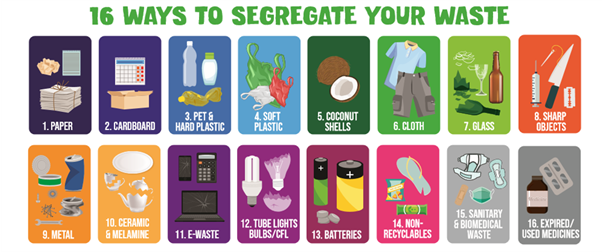16-ways of segregating waste: Panaji’s innovative model of solid waste management
January 18, 2023
A progressive waste management strategy includes mobilizing collective and individual action and segregating waste at the source itself.
Even as urban cities around the world grapple with the problem of managing their waste, the capital of the sun-kissed State of Goa, has put in place a first-of-its-kind segregation system that is economically viable and drastically improves the quantity of waste that is recycled.
Panaji, an urban tourist city, is getting the community and big generators of waste (BWG) to segregate waste in 16 different ways, right at the source – an initiative that is new not only to India but also the world.
As per data by Ministry of Housing and Urban Affairs, India generates around 1.43 lakh tonnes per day (TPD) municipal solid waste. The rate of waste generation is expected to increase in tandem with economic growth because of consumption-based systems. This increasing volume of waste and its mismanagement has led to a perplexing challenge for the planet.
The need of the hour is a progressive waste management strategy that mobilizes collective and individual action and emphasises waste segregation at the source itself.
Panaji generates around 42 tonnes per day (TPD) of waste. After segregation, wet waste is composted, while recyclable dry waste is sent to recyclers and non-recyclables to cement factories as Refuse Derived Fuel (RDF) for co-processing.
While most cities in India are implementing a 2-way (Wet and Dry) waste segregation system, the city of Panaji, under the HDFC-United Nations Development Programme Dry Waste Management project, has implemented an innovative model for a 16-way segregation at source.

Mixed dry waste is manually segregated by Safai Sathis through a conveyor belt for further processing and recycling at Material Recovery Facilities set up by UNDP and HDFC Bank.
Under this model, all bulk waste generators (BWGs), including housing societies, sort their dry waste into 16 different streams like e-waste, paper, ceramic, cloth, cardboard, sharps (needles, blades) etc.
A resident of Kamat Galaxy segregates waste according to 16 ways. 44 societies in Panaji are already implementing this unique model of sources segregation.
Once segregated, the waste goes through different streams of recycling and resource recovery, eliminating the need to send any to a landfill. The 16-way segregation model is cheaper, requires minimal manual or mechanical sorting, and reduces the burden on the environment.
More importantly, this innovative system reduces the occupational health risks for Safai Sathis (waste pickers), who work on segregating the waste at Swachtha Kendras (material recovery facilities).

“At Panaji, we have always tried to stay a step ahead of the waste problem. Now we have mandated 16-way segregation of waste at source for all BWGs. Our objective is to ensure that the waste goes through different streams for recycling and resource recovery. We want to see Panaji becoming a Zero-waste -Zero-Landfill city,” said Sachin Ambe, Municipal Engineer (Grade-II) Head of Waste Management Cell, Corporation of the City of Panaji (CCP), who has been spearheading the waste management system in the city for a decade.
To kickstart the 16-day segregation initiative, UNDP India and Feedback Foundation, the implementing partner for the project, conducted several training and awareness drives including segregation workshops for citizens and training sessions for Safai Sathis.
Multiple meetings were held with BWG stakeholders, informing them of the benefits of the system and its key features. The team adopted a holistic behaviour change model that aimed to evoke a positive change in public mindset, inform people about best practices, and ensure safety of those working with waste.
The model was first demonstrated at the Revival 2020 -a two-day sustainability-themed event in the city. Citizens were encouraged to bring in their dry waste and segregate the waste themselves. A total of 74 citizens turned up with 650 kgs of waste!
Out of the 81 housing societies who were identified as BWGs, 44 have already implemented the system, which simply involves keeping 16 bins.
To offset the considerable capital costs, a purchase model was initiated to buy back waste from the BWGs involved in 16-way segregation. Waste such as paper, PET bottles, metals, glass, coconut shells and even MLP (multi-layered plastic) were bought, thus generating revenue for the BWG and the engaged Safai Sathis. BWGs are estimated to see a 20% increase in revenue, year-on-year.
The model reduces the occupational health risks for the Safai Sathis and helps them earn better income.
House of Lords in Panaji was one of the first housing societies to implement this system. According to a resident, Ms. Gabriela, "This is a revolutionary system and a fantastic step in the right direction. Segregation is the most important aspect for waste, and I hope this excellent initiative continues, we can make the whole city of Panaji into a 16-way city".
These efforts gained further momentum in October 2020, when the Corporation of the City of Panaji (CCP) amended their Solid Waste (Management and Handling) Bylaws to mandate all BWGs to implement the 16-way segregation of dry waste, at the source.
“The 16 Way Dry Waste Segregation model is a boon for both residents and the environment. It also helps our residential society as we get good returns by selling the recyclable waste to the authorities. Even our waste can generate wealth and be an asset to us,” said Mr. Melwin G. Furtado of the Kamat Galaxy society.
Panaji’s efforts have also been recognized by Government of India’s apex public policy think tank– NITI Aayog. In its report ‘Waste-wise Cities: Best practices in municipal solid waste management’, Panaji was among the highest scoring Indian city for having put in place a sustainable waste management system.
Since July 2020, Panaji has handled over 170 MTs of waste through the 16-way segregation system for dry waste.
This goes to prove that through smart planning, citizen cooperation and the support of Urban Local Bodies (ULB), circular economy is not a cumbersome concept but a self-sustaining and rewarding solution.

 Locations
Locations